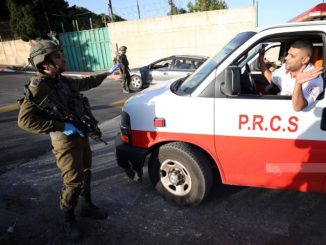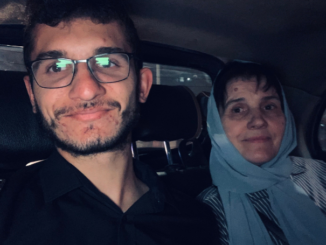
Areeb Al-Rantawi critiques the Palestinian Authority’s security-focused approach to the Israeli occupation of Palestine, calling for a reevaluation of its strategies and a new, unified national movement prioritizing resistance over compromise.
In a recent opinion piece published on Aljazeera Arabic, prominent Jordanian political analyst Areeb al-Rantawi critiques the Palestinian Authority’s approach to the ongoing conflict in Jenin and its broader strategy for dealing with Israel and Palestinian resistance.
Al-Rantawi suggests that the Authority’s actions are deeply rooted in a flawed framework that has long prioritized security coordination with Israel over true national unity or resistance to occupation. He calls for a fundamental reevaluation of Palestinian leadership, arguing that the status quo is no longer tenable.
Al-Rantawi begins by noting that recent developments in Jenin and its refugee camp signal a shift in the PA’s approach to the Israeli-Palestinian conflict.
He observes that the Authority has been largely following an Israeli-designed framework for the past 15 years, one that prioritizes security cooperation with Israel while sidelining resistance movements.
However, the ongoing military campaign in Jenin, which has killed and wounded many Palestinians in the name of asserting PA sovereignty in areas under its control, raises significant questions about the Authority’s role and allegiances.
The opinion piece identifies three key perspectives within Palestinian political thought in response to the Authority’s actions.
The PA’s Perspective
Al-Rantawi notes that the Palestinian Authority has framed the situation in Jenin as a worsening of security issues, with fighters in the area described as “militias” rather than resistance groups.
The PA claims these groups are often driven by foreign agendas, particularly from Iran and its allies.
This narrative, al-Rantawi argues, reflects the Authority’s broader commitment to security coordination with Israel and its continuing pursuit of a model that prioritizes control over resistance.
Resistance Factions’ Perspective
From the perspective of Palestinian resistance factions, the Authority’s military campaign is seen as a direct attempt to align with Israeli interests.
These factions argue that the PA is complicit in Israel’s broader strategy of suppressing Palestinian resistance, particularly in Gaza.
Al-Rantawi suggests that these groups view the Authority’s actions as part of a larger effort to neutralize resistance in the West Bank and serve the interests of external powers, including the United States and Israel.
The Intellectual and Political Elite’s Perspective
Al-Rantawi also highlights a third view, held by a smaller group of Palestinian intellectuals and political figures, who argue that the Authority’s actions in Jenin stem from a fear of Israel’s plans to forcibly expel Palestinians from the West Bank.
These voices contend that the Authority is trying to preempt such moves, acting out of fear of replicating the situation in Gaza.
The central argument in al-Rantawi’s piece is that the PA has become increasingly disconnected from the national aspirations of the Palestinian people. He notes that the Authority’s approach to governance has been shaped by the “New Palestinian Man” theory, a US-backed framework that sees resistance as terrorism and frames Israel not as the primary enemy, but as a partner in the fight against extremism.
Under this model, the PA has prioritized maintaining security coordination with Israel over building a unified national resistance.
Al-Rantawi further argues that the PA’s actions in Jenin are not only a failure to support the Palestinian Resistance, but also a missed opportunity to engage in meaningful political dialogue. He contends that the Authority’s focus on security operations is indicative of its broader strategy of appeasing external powers, particularly the US and Israel, in exchange for continued political survival.
One of the most critical points in al-Rantawi’s analysis is the idea that the PA’s attempts to secure its position have failed to address the underlying political and national issues. Instead of striving for unity and advancing a comprehensive national project, the Authority is perpetuating divisions and reinforcing the status quo.
Al-Rantawi argues that the Palestinian people need a new approach, one that moves beyond the failed policies of the past and seeks to rebuild the Palestinian national movement.
Al-Rantawi’s critique is particularly pointed in his analysis of the upcoming political shifts, both regionally and internationally.
With a potentially more hardline US administration poised to take power, he suggests that the PA is focusing on appeasing Washington and Tel Aviv, at the expense of the Palestinian cause.
He notes that the Authority’s current trajectory is one of increasingly aligning itself with Israeli and American interests, rather than fighting for the fundamental rights of the Palestinian people.
New National Project
Al-Rantawi urges the Palestinian leadership to abandon its reliance on outdated strategies and illusions. He calls for the creation of a new national project that transcends the narrow interests of the Palestinian Authority and its security-focused approach.
He argues that the time has come for Palestinian factions, both within and outside the Authority, to work together towards a new, unified vision for the future, one that prioritizes resistance and national liberation over compromise with Israel and the international community.
Al-Rantawi’s views serve as a stark reminder of the deepening political crisis within Palestinian leadership and the urgent need for a fresh direction in the struggle for Palestinian self-determination.
As the conflict continues, the question remains whether the PA can change its course, or whether a new generation of leaders will take the reins in charting a more inclusive and resistance-driven path forward.
(Al-Jazeera Arabic. Translated and prepared by the Palestine Chronicle)









Bullsh!t. the P.A., are obviously being told what to say and do, by whom? And, what was their involvement on October 7th, 2023?
Clearly Hamas didn’t do all that damage. It was obviously the IDF, the settlers and the P.A., in a false flag operation: trained by American troops on the ground there. It’s public info that ” they ” trained just outside the border for at least a month.
The approach of the pa under Mr Abbas is a colonist agenda that undermines the Palestine people it is apartheid in principle. Mr Abbas is clearly out of touch with his people and would be better off living in Israel and applying for citizenship as he continues to broaden their colony.mr Abbas needs to be replaced from his role the last fifteen years a pro Israel agenda that sells out his own people a complete failure of leadership and he has undermined his own people . Mr Abbas is solely about him self and wants to lay in bed with the west for financial purposes and to be seen as a respected leader Hollywood style.simply Mr Abbas is a puppet of the west fed and clothed by these monster.
The approach of the pa under Mr Abbas is a colonist agenda that undermines the Palestine people it is apartheid in principle. Mr Abbas is clearly out of touch with his people and would be better off living in Israel and applying for citizenship as he continues to broaden their colony.mr Abbas needs to be replaced from his role the last fifteen years a pro Israel agenda that sells out his own people a complete failure of leadership and he has undermined his own people . Mr Abbas is solely about himself and wants to lay in bed with the west for financial purposes and to be seen as a respected leader Hollywood style.simply Mr Abbas is a puppet of the west fed and clothed by these monsters.
So, long story short, you want to murder Jews? Tell me something I don’t know.